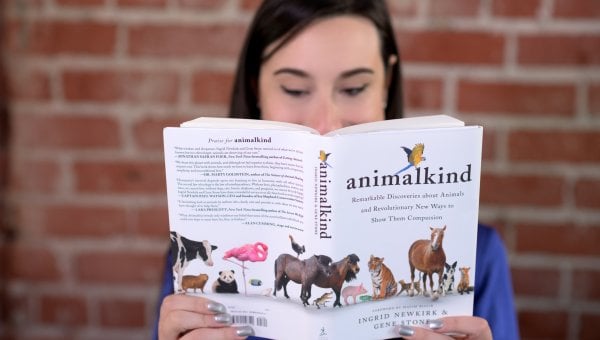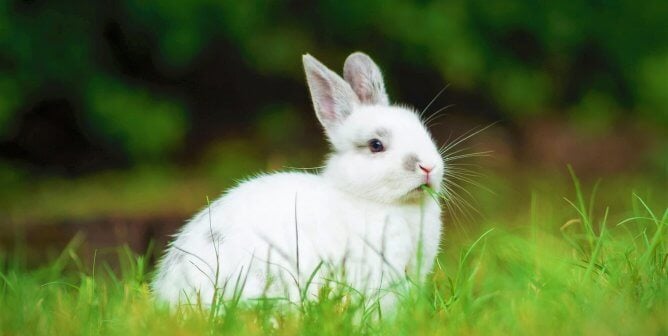Rabbits are fascinating animals who deserve respect and need protection. Check out these 13 rabbit facts about these sensitive beings who suffer in the pet trade. Then, see how you can take action for these often-misunderstood individuals.
1. Rabbits are—after dogs and cats—the third most common animals brought to animal shelters.
Did you know that if you buy a rabbit from a pet store, you’re preventing a rabbit at a shelter from finding a home? Three words: Adopt, don’t shop!
2. They’re all about territory.
If you have a rabbit, you quickly learn that they rule the roost. They need lots of space and will quickly decide where they like to eat, sleep, and use the bathroom. Make the mistake of cleaning a rabbit’s area in front of them and you may just be grunted at.
3. Bunnies are nocturnal, right?
Nope! Another question that people often ask is whether rabbits sleep mostly during the day or at night. And the answer is neither. They are crepuscular, meaning that they are most active at dusk and dawn.

4. Rabbits need special veterinarians.
Veterinarians who are experts on lagomorphs (rabbits, hares, and pikas) can be more expensive than cat and dog vets as well as harder to find. If you’re considering adopting a rabbit, be sure to identify a high-quality vet who specializes in lagomorphs in your area first.
5. Rabbits get bored.
Just like humans, rabbits need socialization, space in which to exercise, and plenty of toys to keep themselves entertained. A stuffed paper towel roll or cardboard oatmeal canister with timothy hay allows rabbits to roll, chew, and play to their heart’s content.
6. They’re not good “pets” or Easter gifts.
Many people think that rabbits involve less of a commitment than dogs or cats. However, caring for them typically requires even more attention and effort than caring for a canine or feline companion. Rabbits can live 10 years or longer, so make sure that you’re ready for the responsibility.
7. Rabbits purr when they’re happy.
It’s not the same as a cat’s purr, though. It sounds like teeth chattering or light chomping. Every rescued bunny’s human guardian knows this familiar sound.
8. And they binky when they’re super-happy.
What’s a binky, you ask? Only the cutest thing in the world.
9. Their nails and teeth never stop growing.
Like humans, rabbits’ nails grow constantly. They need to be trimmed about every six weeks. Unlike humans, rabbits’ teeth grow constantly! This makes it imperative that rabbits have access to unlimited timothy hay and wooden toys to chew on. If a rabbit’s teeth stop grinding down normally, he or she may find eating painful and starve.
Rabbit guardians must strictly monitor their companion’s eating habits. Even 12 hours without food can be deadly for them.
10. Outside is a scary place for domesticated bunnies.
Rabbits left outside are at risk of being hurt or killed by predators, even in a hutch. Other animals aren’t the only danger: Common pesticides sprayed in grassy areas can poison bunnies.
11. They’re prey animals.
Rabbits who are sick or in pain will hide it as much as possible, and ones who are afraid may run or jump away so quickly that they hurt themselves. That’s why it’s always important to pay close attention to your rabbit’s behavior and try not to startle them.
12. Rabbits eat their droppings.
Rabbits need to digest their food twice. Healthy bunnies will eat soft cecotropes directly from their rear end, so some rabbit guardians may rarely see this type of stool. The hard, round pellets that the animals ultimately defecate are the second round of elimination, expelled for good once nutrient absorption is complete.
13. Every rabbit has a unique personality.
Are rabbits like cats or like dogs? Neither!
Rabbits are unique characters. It may take human guardians months to appreciate the complex personality traits of their companion. One thing you should ask yourself before bringing a bunny into your home is whether he or she will get along with any animal companions you currently live with. Bonding takes a lot of time and energy, and it can be risky to put animals together who don’t yet know one another.
Frequently Asked Questions About Rabbits
Do Rabbits Like to Be Cuddled?
As prey animals, some rabbits may find it frightening to be handled or held. Every rabbit has a different personality, and many enjoy physical touch. It’s important to be respectful of the animal’s boundaries and body language. Never hold or touch a rabbit who is showing signs of fear.
What Do Bunnies Eat?
Timothy hay—all day, every day! With advice from a veterinarian, high-quality pellets made for rabbits (containing no seeds, nuts, or other fillers) may be offered in a quantity based on their health needs. A rabbit’s diet should also be supplemented with fresh greens but not iceberg or romaine lettuce, which contains too much water for them. An occasional carrot or apple slice works as a treat for bunnies.
Do Rabbits Use Litterboxes?
Yes! Healthy adult rabbits will typically choose one place to do their business. A bunny litterbox should be lined with newspaper or hardwood shavings topped with hay. Never use pine, cedar, or cat litter, which can be dangerous and even deadly for rabbits.
Do Rabbits Have a Good Sense of Smell?
Rabbits have an excellent sense of smell, so it’s vital to keep their litterbox and living area clean for them.
What Is a Rabbit’s Life Expectancy?
Rabbits can live for 10 years or more.
*****
Remember: Rabbits are interesting individuals who need special attention and care. The best thing that you can do for ones suffering in the pet trade is to tell everyone you know never to buy them from a pet store, a breeder, websites like Craigslist, or anywhere else. Instead, if you’re ready for the commitment, adopt one from a shelter.
Want to share your bunny love? Share this page!
Learn more fascinating facts and read more inspiring stories about rabbits and other animals in the bestselling book Animalkind.







